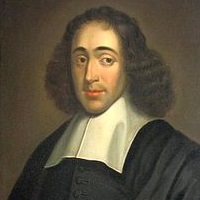Quotes
<< Prev Next >>
The greatest pride, or the greatest despondency, is the greatest ignorance of one's self
The endeavor to understand is the first and only basis of virtue
So long as a man imagines that he cannot do this or that, so long as he is determined not to do it; and consequently so long as it is impossible to him that he should do it
Sin cannot be conceived in a natural state, but only in a civil state, where it is decreed by common consent what is good or bad
Pride is pleasure arising from a man's thinking too highly of himself
Only that thing is free which exists by the necessities of its own nature, and is determined in its actions by itself alone
One and the same thing can at the same time be good, bad, and indifferent, e.g., music is good to the melancholy, bad to those who mourn, and neither good nor bad to the deaf
It may easily come to pass that a vain man may become proud and imagine himself pleasing to all when he is in reality a universal nuisance
If you want the present to be different from the past, study the past
If men were born free, they would, so long as they remained free, form no conception of good and evil
Search
On Anger: "For every minute you remain angry, you give up sixty seconds of peace of mind."
Essays
Essays
On Destiny: "Our destiny exercises its influence over us even when, as yet, we have not learned its nature: it is our future that lays down the law of our today."
Human, All Too Human
Human, All Too Human
On Friendship: "A crowd is not company; and faces are but a gallery of pictures; and talk but a tinkling cymbal, where there is no love."
Essays
Essays














